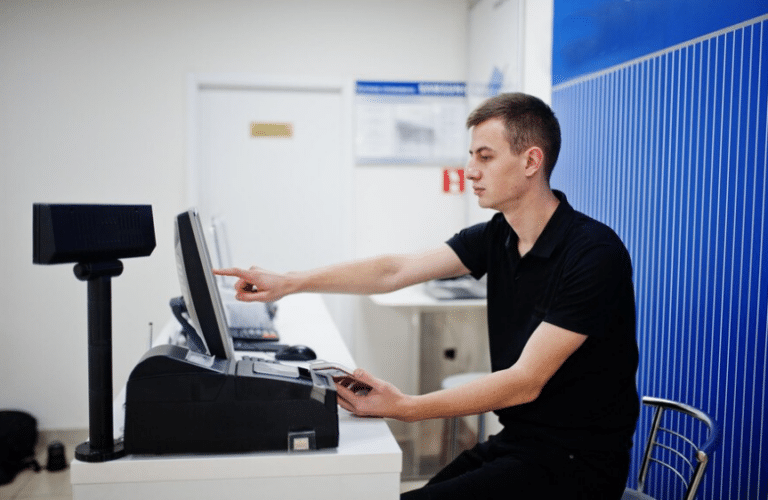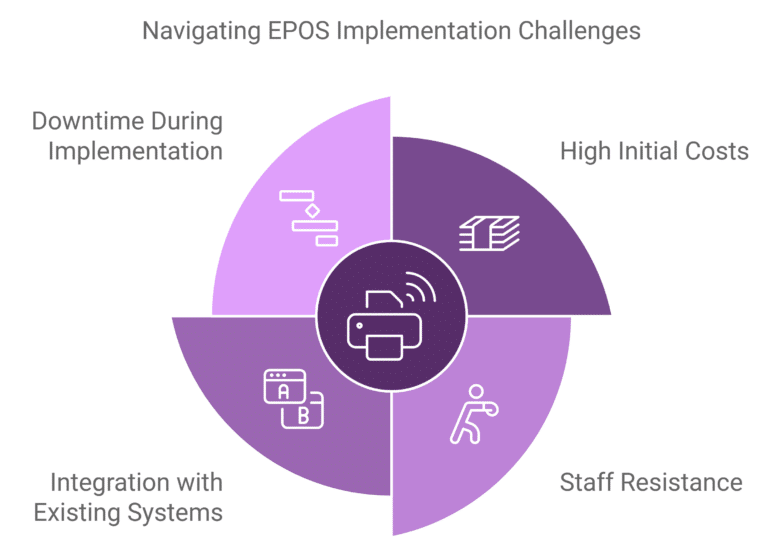Let’s be real, business efficiency isn’t a luxury; it’s a lifeline. For UK businesses, staying competitive means finding ways to do more with less. Time wasted on outdated processes or slow systems can cost customers and revenue. The solution? Smarter tools.
Tools like an EPOS system. With over 20% of UK businesses citing rising operational costs as their top challenge, adopting systems that improve productivity and reduce errors is critical. Want to know how EPOS systems can increase business efficiency? Let’s find out.
What is an EPOS system?

An EPOS system (Electronic point of sale) is more than just a payment terminal – it’s a robust tool designed to revolutionise how businesses operate. Unlike traditional types of POS systems, EPOS solutions integrate advanced software and hardware to handle transactions, inventory and customer data in real time.
Think of it as the brain behind your operations. While a retail store, for example, uses EPOS to track sales and manage stock, a restaurant can streamline table orders and payments with it.
Compare POS System Quotes Today
How does an EPOS system increase business efficiency?

An EPOS system is a game-changer for businesses aiming to streamline operations, minimise errors and enhance the customer experience. Let’s break down how an EPOS system achieves this:
1. Streamlined transactions
Nobody likes waiting in line. An EPOS system speeds up transactions, whether it’s processing a card payment at the payment terminal or handling cash at the cash drawer. The result? Happy customers and faster service.
Not only does it allow customers to pay with their preferred method, be it cash, card or digital wallet, but the staff can focus on multiple tasks like assisting customers while the sales are processed automatically.
According to an article by ConnectPOS, retail transactions done using EPOS systems are completed 25% quicker than normal POS systems.
2. Real-time inventory management
Another big advantage of an EPOS system is that it takes the guesswork out of inventory management by automating the entire process. Every sale is tracked in real time and the system updates stock levels instantly.
This level of automation doesn’t just save time; it actively reduces waste and improves cash flow. Instead of tying up money in surplus stock or risking missed sales due to shortages, you can focus on carrying the right products at the right time.
It also improves decision-making. You can analyse sales data to identify bestsellers, seasonal demands and slow-moving items to make sure every purchasing decision is informed by accurate data.
3. Increased accuracy and minimised human errors
One of the biggest ways an EPOS system increases business efficiency is by handling billing and pricing accurately. With pre-programmed pricing and automated calculations, you can say goodbye to incorrect totals or forgotten discounts. This eliminates the need for staff to double-check transactions, especially during peak hours.
Another area where EPOS solutions shine is stock management. When sales are recorded digitally, it reduces the chance of discrepancies caused by manual stock counts.
An article in Elsner reported that 43% of retailers saw a significant reduction in stockouts and overstock after implementing a POS system.
4. Better employee management
EPOS systems also improve efficiency by automatically logging sales data for each team member. This allows you to track individual performance metrics such as sales figures, upsell success rates and transaction times. With these insights, identifying top performers becomes effortless, enabling you to reward their efforts and boost morale.
What’s more? It helps in scheduling as well. By analysing data, you can predict peak hours and adjust staff accordingly. For example, a restaurant owner in London uses an EPOS-generated report to ensure that more staff are on hand during Friday night rushes.
Employee accountability is also improved. With unique login credentials for each team member, the system tracks who handles which transactions.
5. Flexibility for multiple locations
EPOS systems offer a centralised solution to allow you to oversee operations across all locations from one platform. It impacts your business positively:
- Sales, inventory and employee performance data from all locations are consolidated in one dashboard which allows you to have a complete overview of your business at a glance.
- The inventory data is synchronised across locations which allows you to monitor stock levels.
- Consistent pricing and policies are implemented across all locations which reduces errors and ensures uniformity.
Challenges in implementing EPOS systems & how to overcome them
Adopting an EPOS system can transform your business, but like any new technology, it comes with its own set of challenges.
- High initial costs: Setting up an EPOS system requires a high initial cost. But treat this cost as an investment rather than an expense. Many providers offer flexible payment plans and leasing options as well, so you can employ them.
- Staff resistance: It can feel overwhelming for your employees, leading to improper use. To overcome it, provide comprehensive training sessions tailored to your team’s needs.
- Integration with existing systems: If your current tools don’t align with the EPOS, you might face disruptions during implementation. Therefore, before purchasing it, ensure it’s compatible with your existing accounting or CRM tools.
- Downtime during implementation: Switching from manual systems can cause temporary disruptions. So it’s important to plan the transition during a slow business period, such as mid-week or off-season.

Business leaders on EPOS systems
- Scott Frisby, Head of Strategy at Elavon, says that smaller merchants can have access to sophisticated software configurations in the POS system for a fixed monthly fee, which is great.
- Carol Grunberg, Chief Business Officer at Yuno, says that AI-powered POS systems can analyse purchase history and customer preferences to offer personalised recommendations, which boosts customer engagement.
- Carol added that AI algorithms are increasingly being used to prevent fraudulent activities at the POS.
- Scott was excited to talk about how EPOS systems are ideal for brick-and-mortar businesses that want to dip their toes into e-commerce.
Get the Best EPOS Systems For Your POS Transactions With ComparedBusiness
We at ComparedBusiness are experts in saving your time and money. Just tell us what kind of EPOS system you need (it takes less than 2 minutes), & we will get back to you with quotes from a list of top EPOS system providers that are right for your business. You can pick and choose the best option for your business.
FAQs
An EPOS system automates tasks like billing, inventory tracking and sales reporting. This minimises the chances of mistakes. And with pre-programmed prices and real-time data updates, it eliminates errors caused by manual processes, which ensures improved accuracy.
Yes, modern EPOS systems in the UK integrate seamlessly with accounting software like QuickBooks, Xero and Sage. These integrations automate financial tracking to make reconciliations and tax preparations much easier and error-free.
An EPOS system can improve business efficiency by significant numbers. It achieves this through faster transactions, automated inventory management and reduced errors. All of these allow businesses to focus on growth, do more with less and improve the customer experience.
